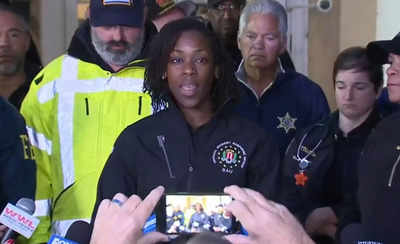The Federal Bureau of Investigation (FBI) is under intense scrutiny following the New Orleans New Year’s Day attack, an incident that led to confusion over whether it constituted an act of terrorism. While investigations continue, the controversy has reignited broader debates over the agency’s recruitment standards and the influence of diversity, equity, and inclusion (DEI) initiatives.
The Incident and Its Fallout
The New Orleans attack, where a pickup truck plowed into a crowd on Bourbon Street, killing and injuring multiple people, was initially categorized by the FBI as non-terroristic. However, the discovery of potential ties to extremist ideologies, including an Islamic State flag attached to the vehicle, prompted the FBI to reclassify the incident as a terrorism investigation.
The suspect, identified as Shamsud-Din Jabbar, was killed in a confrontation with law enforcement after the attack. Authorities revealed that the truck used in the attack was adorned with a black flag resembling those associated with the Islamic State and contained several improvised explosive devices (IEDs), though their viability is still under investigation. Jabbar’s background has raised additional concerns; he was reportedly on a federal watchlist due to past associations with extremist groups. Investigators are now probing his potential connections to larger networks and whether he acted alone or as part of a coordinated effort.
Witnesses described the horrifying scene as the truck veered into the crowd, causing chaos during New Year’s celebrations. Surveillance footage has provided crucial evidence, showing Jabbar’s movements in the hours leading up to the attack. While the motive is still being determined, preliminary findings suggest ideological influences may have played a role.
Special Agent Alethea Duncan, one of the FBI’s public faces during the probe, initially stated that the attack did not meet the criteria for terrorism. This apparent flip-flop drew sharp criticism from conservative commentators and social media users, who accused the FBI of attempting to minimize the attack’s severity. The criticism intensified when reports emerged that the agency’s recruitment practices—influenced by DEI policies—may be compromising its effectiveness.
Nose Rings and FBI Policy
The controversy surrounding Special Agent Alethea Duncan has also drawn attention to her nose ring, which some critics have used as a symbol of perceived lax standards within the agency.
According to the FBI’s official dress and appearance guidelines, agents are expected to maintain a professional appearance that aligns with the bureau’s mission. While there is no outright ban on nose rings, such accessories are typically discouraged in field operations or high-visibility roles to ensure uniformity and professionalism. Exceptions may be granted based on cultural or religious grounds, reflecting broader DEI policies aimed at inclusivity.
DEI and the FBI
Under the leadership of FBI Director Christopher Wray, DEI initiatives have been central to the agency’s efforts to diversify its workforce. According to a report submitted to the House Judiciary Committee, these initiatives prioritize race, gender, and sexual orientation over traditional qualifications such as physical fitness, integrity, and experience. Critics argue that this shift undermines the FBI’s mission to protect national security.
The report, compiled by an alliance of active-duty and retired FBI agents, paints a grim picture of recruitment practices. It alleges that:
- Candidates with significant physical fitness deficits and questionable academic qualifications are being admitted.
- The drug policy for applicants has been “liberalized,” allowing individuals with histories of substance abuse to join the bureau.
- Supervisors are pressured to advance candidates who fail basic requirements, including fitness tests and English proficiency, to meet DEI goals.
Conservative Backlash
Right-wing commentators and politicians have seized on these allegations to critique the FBI’s priorities. Figures like Miranda Devine of the New York Post argue that DEI mandates are diluting the FBI’s quality and effectiveness, prioritizing political correctness over competence.
Social media has amplified these concerns, with users highlighting cases from the report that describe candidates being pushed through despite serious disqualifications. For example, one account mentions an applicant rejected by local police but later hired by the FBI under non-special-agent roles. Another recounts an overweight recruit being advanced despite failing physical fitness standards.
Broader Implications
The controversy over DEI in the FBI is emblematic of larger cultural battles within the United States. Proponents of DEI argue that a diverse workforce strengthens the FBI by bringing varied perspectives and fostering trust with historically underrepresented communities. Critics counter that these policies prioritize ideology over competence, risking national security.
The alliance of whistleblowers warns that the current trajectory could lead to “generational failure” within the bureau. They have called for an audit of FBI recruitment practices and demanded congressional oversight to ensure that recruitment standards are aligned with national security priorities.
A Divided Narrative
The uproar over Alethea Duncan’s handling of the New Orleans attack highlights the challenges facing the FBI in balancing operational transparency with public relations. Right-wing critics frame Duncan’s role—and her visible nose ring—as symbolic of the “woke” culture they believe has infiltrated the agency. Others see this focus as a distraction from the substantive issues surrounding the attack and the FBI’s response. As the FBI continues its investigation into the New Orleans attack, the agency faces mounting pressure to address criticisms of its recruitment and training practices. For its detractors, the debate over DEI is not merely about hiring policies but about the FBI’s ability to fulfill its core mission: safeguarding the nation. Whether the FBI can navigate this contentious terrain without losing public trust remains to be seen.




